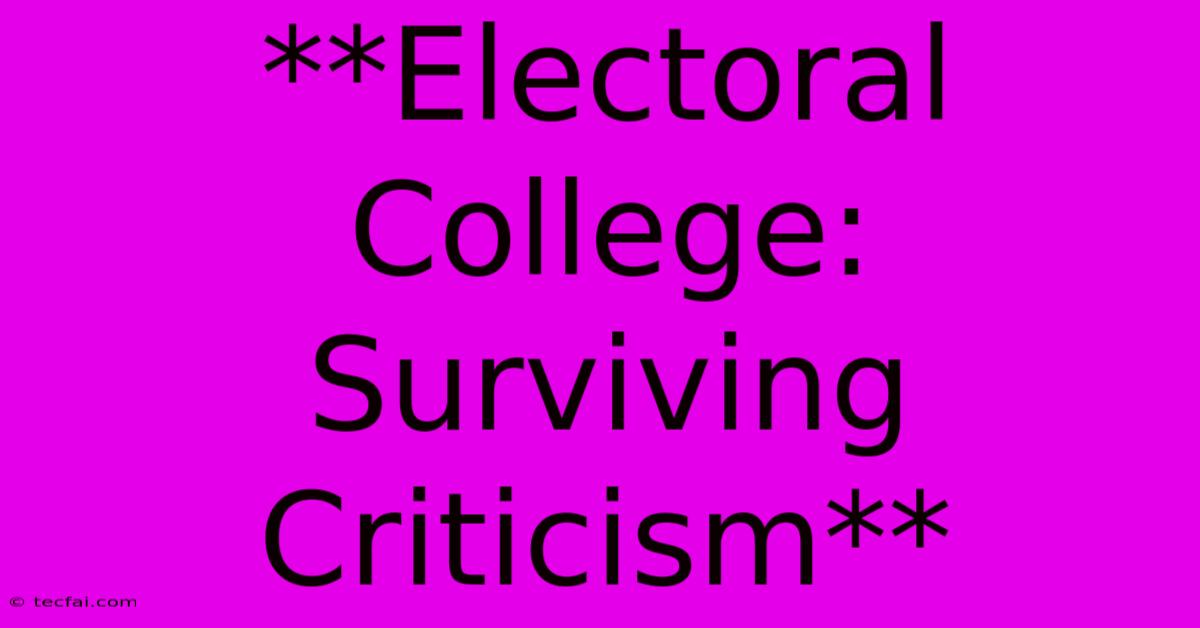**Electoral College: Surviving Criticism**

Discover more detailed and exciting information on our website. Click the link below to start your adventure: Visit Best Website tecfai.com. Don't miss out!
Table of Contents
Electoral College: Surviving Criticism
The Electoral College, a cornerstone of the American presidential election system, has long been a source of debate and criticism. While it remains a crucial part of the political landscape, its validity is constantly questioned, particularly in the wake of close elections and contested results.
Understanding the Electoral College
The Electoral College system, established by the Founding Fathers in 1787, determines the winner of the presidential election. Each state is allocated a number of electors based on its population, with the District of Columbia receiving three electors. The candidate who receives a majority of electoral votes (at least 270 out of 538) wins the presidency.
The system, however, has been criticized for several reasons:
- Winner-take-all system: Most states employ a winner-take-all system, meaning the candidate who receives the most votes in a state wins all of that state's electoral votes, regardless of the margin of victory. This can lead to situations where a candidate wins the popular vote nationwide but loses the election due to a larger number of electoral votes won in fewer states.
- Disproportionate representation: The Electoral College system can give disproportionate power to certain states, particularly smaller, less populous states. This is because each state receives at least three electors, regardless of its population, and the distribution of electors is not perfectly proportional to population.
- Potential for faithless electors: Though rare, there is a possibility of "faithless electors" who vote for a candidate other than the one who won the popular vote in their state.
Arguments in Favor of the Electoral College
Despite the criticisms, the Electoral College has its supporters, who argue that it:
- Protects the interests of smaller states: By giving each state a minimum number of electors, the system ensures that smaller states have a voice in the presidential election and are not simply dominated by larger states.
- Encourages candidates to campaign across the country: The need to win electoral votes in various states encourages candidates to focus their campaigns on a wider range of voters, rather than just focusing on large population centers.
- Reduces the likelihood of a national election: The Electoral College system can help to prevent a single candidate from winning by a landslide, which could potentially lead to instability and polarization.
Moving Forward: Reform or Abolition?
The debate over the Electoral College is likely to continue, with both sides presenting compelling arguments. Some advocates for change propose reforms, such as a national popular vote system or a proportional allocation of electoral votes within states. Others argue for complete abolition and the adoption of a direct popular vote system.
While the Electoral College remains a cornerstone of the American political system, its future is uncertain. The ongoing debate reflects the evolving political landscape and the ongoing efforts to ensure that the system remains representative and reflects the will of the people.

Thank you for visiting our website wich cover about **Electoral College: Surviving Criticism** . We hope the information provided has been useful to you. Feel free to contact us if you have any questions or need further assistance. See you next time and dont miss to bookmark.
Featured Posts
-
Governor Newsom Remembers Quincy Jones
Nov 05, 2024
-
Hunts Td Lifts Chiefs Past Buccaneers
Nov 05, 2024
-
Liverpools Champions League Challenge Against
Nov 05, 2024
-
Nfl Trade Deadline 6 Impactful Moves To Watch
Nov 05, 2024
-
Joe Rogan Throws Support To Trump
Nov 05, 2024
